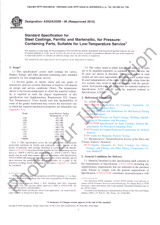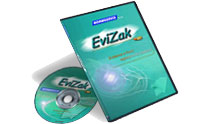Wir benötigen Ihre Einwilligung zur Verwendung der einzelnen Daten, damit Sie unter anderem Informationen zu Ihren Interessen einsehen können. Klicken Sie auf "OK", um Ihre Zustimmung zu erteilen.
ASTM D2603-20
Standard Test Method for Sonic Shear Stability of Polymer-Containing Oils
Name übersetzen
NORM herausgegeben am 1.5.2020
Informationen über die Norm:
Bezeichnung normen: ASTM D2603-20
Ausgabedatum normen: 1.5.2020
SKU: NS-993145
Zahl der Seiten: 4
Gewicht ca.: 12 g (0.03 Pfund)
Land: Amerikanische technische Norm
Kategorie: Technische Normen ASTM
Kategorie - ähnliche Normen:
Die Annotation des Normtextes ASTM D2603-20 :
Keywords:
shear stability, sonic shear test, viscosity stable ,, ICS Number Code 75.100 (Lubricants, industrial oils and related products)
Ergänzende Informationen
| Significance and Use | ||||||
|
4.1 This test method permits the evaluation of shear stability with minimum interference from thermal and oxidative factors which may be present in some applications. Within the limitations expressed in the scope of this test method, it has been successfully applied to hydraulic fluids, transmission fluids, tractor fluids, and other fluids of similar applications. It has been found applicable to fluids containing both readily sheared and shear-resistant polymers. Correlation with performance in the case of automotive engine applications has, to date, not been established. |
||||||
| 1. Scope | ||||||
|
1.1 This test method covers the evaluation of the shear stability of an oil containing polymer in terms of the permanent loss in viscosity that results from irradiating a sample of the oil in a sonic oscillator. This test method can be useful in predicting the continuity of this property in an oil where no change is made in the base stock or the polymer. It is not intended that this test method serve to predict the performance of polymer-containing oils in service. 1.2 Evidence has been presented that correlation between the shear degradation results obtained by means of sonic oscillation and those obtained in mechanical devices can be poor. This is especially true in the case of automotive engines. Further evidence indicates that the sonic technique may rate different families of polymers in a different order than mechanical devices.1.3 Because of these limitations, the committee under whose jurisdiction this test method falls has developed alternative shear test methods using a diesel injector nozzle, Test Methods D5275, D6278, and D7109. While those test methods have found some utility in the evaluation of crankcase oils, the stress imparted to the sample has been found to be insufficient to shear polymers of the shear-resistant type found in aircraft hydraulic fluids. 1.4 This test method is used for polymeric additive specifications, especially in the hydraulic fluid market. 1.5 The values stated in SI units are to be regarded as standard. The values given in parentheses after SI units are provided for information only and are not considered standard. 1.6 This standard does not purport to address all of the safety concerns, if any, associated with its use. It is the responsibility of the user of this standard to establish appropriate safety, health, and environmental practices and determine the applicability of regulatory limitations prior to use. 1.7 This international standard was developed in accordance with internationally recognized principles on standardization established in the Decision on Principles for the Development of International Standards, Guides and Recommendations issued by the World Trade Organization Technical Barriers to Trade (TBT) Committee. |
||||||
| 2. Referenced Documents | ||||||
|
Empfehlungen:
EEviZak – alle Gesetze einschließlich ihrer Evidenz in einer Stelle
Bereitstellung von aktuellen Informationen über legislative Vorschriften in der Sammlung der Gesetze bis zum Jahr 1945.
Aktualisierung 2x pro Monat!
Brauchen Sie mehr Informationen? Sehen Sie sich diese Seite an.




 Cookies
Cookies
